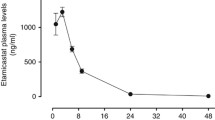Abstract
The effect of intracerebroventricular (i.c.v.) administration of cadmium or magnesium on central calcium-dependent blood pressure regulation was investigated. The systolic blood pressure of spontaneously hypertensive rats (SHR; male, 13 weeks of age) decreased following i.c.v. administration of cadmium chloride (20 nmol/rat), and increased following i.c.v. administration of magnesium chloride (20, 600, and 1200 nmol/rat). The hypotensive effect of cadmium was suppressed by i.c.v. administration of W-7 (a calmodulin antagonist, 30 μg/rat). Taking into consideration these results with our previous reports, it is suggested that cadmium binds to the calcium-binding sites of calmodulin and activates calcium/calmodulin-dependent enzymes in a disorderly manner, whereas magnesium does not. Therefore, cadmium increases dopamine synthesis in the brain via a calmodulin-dependent system, and the resultant increase in dopamine levels inhibits sympathetic nerve activity and reduces blood pressure in SHR.
Similar content being viewed by others
Author information
Authors and Affiliations
Additional information
Received: 12 October 1999 / Accepted: 24 November 1999
Rights and permissions
About this article
Cite this article
Sutoo, D., Akiyama, K. Effect of cadmium or magnesium on calcium-dependent central function that reduces blood pressure. Arch Toxicol 74, 1–4 (2000). https://doi.org/10.1007/s002040050644
Issue Date:
DOI: https://doi.org/10.1007/s002040050644




